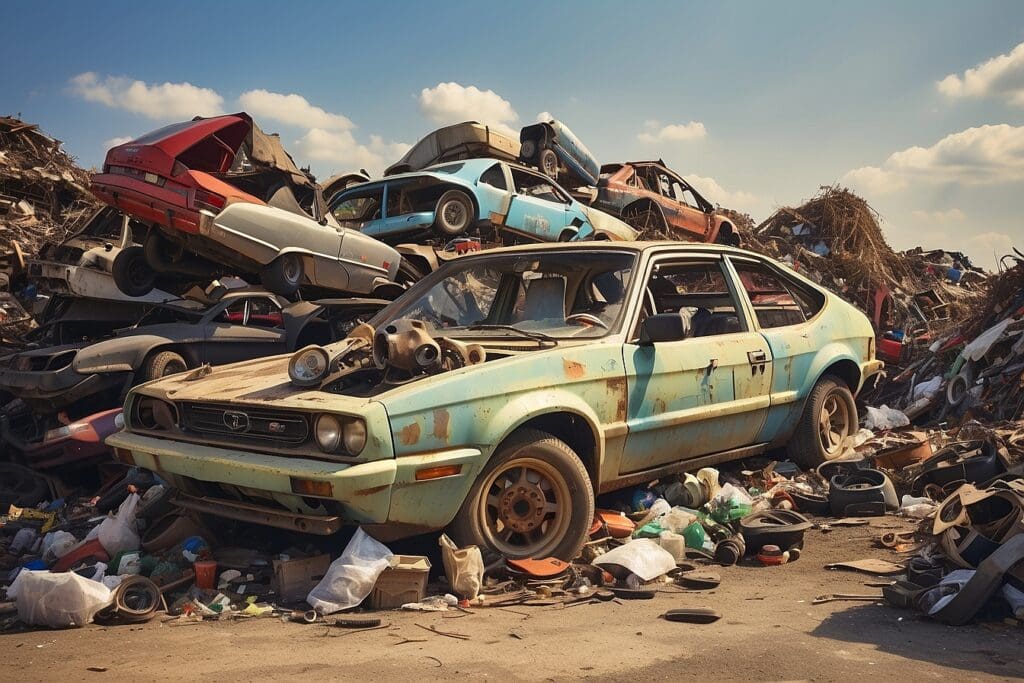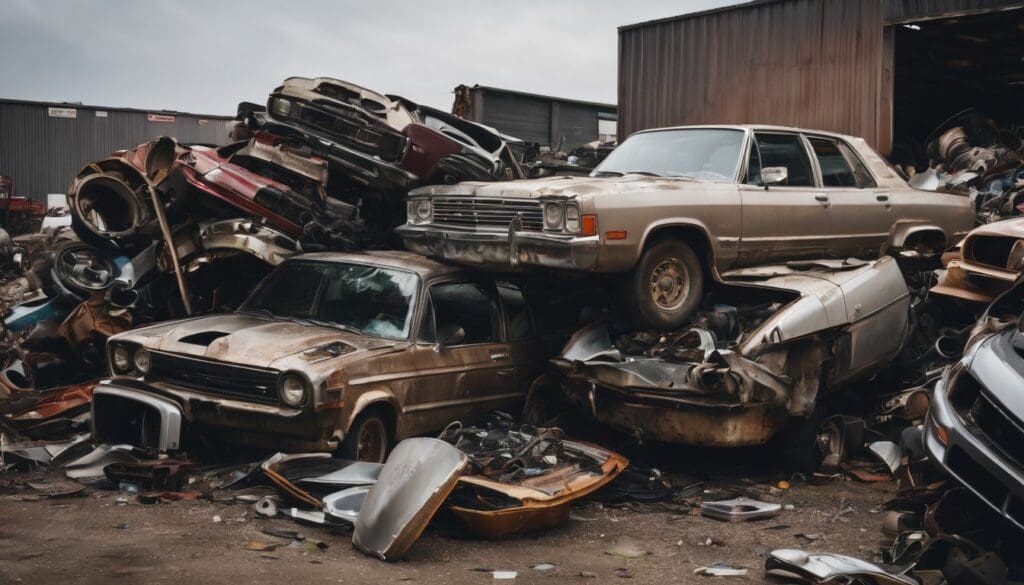We’re all acutely aware of how crucial recycling is in our mission to protect the environment, yet there’s a lesser-told story when it comes to our cars and lorries. In our role as connoisseurs of vehicle recycling, we’ve witnessed the remarkable evolution of this sector.
Here’s a thought-provoking nugget: more than 25 million tonnes of materials are salvaged each year from end-of-life vehicles. Within this blog post, we’ll escort you on an enlightening journey from yesteryear’s methods to today’s state-of-the-art auto recycling advancements that not only keep a bit more jingle in your pocket but also do wonders for Mother Earth.
Let’s rev up and set forth on a path towards a cleaner future!
Key Takeaways
- Vehicle recycling has transformed from basic scrapping to prioritising environmental sustainability, with advanced technologies ensuring every car part is considered for maximum reuse.
- New business models in vehicle recycling focus on sustainable practices like upcycling and using recycled materials in manufacturing, offering economic opportunities while reducing environmental impact.
- The industry must balance the environmental trade – offs of increased energy consumption in recycling processes against the benefits of conserving resources and promoting a circular economy.
- Governments are influencing vehicle recycling through regulations and incentives, driving the industry towards greener practices that align with global conservation efforts.
- The future of auto recycling includes embracing AI and automation to improve efficiency as well as relying more on recycled materials to minimise waste and support a sustainable economy.
Evolution of Vehicle Recycling

The evolution of vehicle recycling has seen a significant shift in paradigms, changes in business models, and an impact on data integrity and inventory acquisition. These developments have also led to changing customer expectations within the automotive recycling industry.
Shifting paradigms
In the ever-changing world of automotive recycling, we’re witnessing a significant shift in how old cars are processed. Traditional methods of simply scrapping vehicles for metal are making way for advanced practices that prioritise environmental sustainability.
We see an increase in upcycling automotive components and a push towards a circular economy in the automotive industry. Our approach now considers every part of the vehicle, from tyres to transmission, ensuring we maximise reuse and recovery.
As auto recyclers, we no longer just dismantle cars; we innovate and adapt. Technological innovation in recycling is at the heart of this transformation. It’s about more than finding spare parts — it’s about redefining end-of-life vehicle management to be cleaner and greener.
We’re committed to responsible auto recycling that reduces waste and serves as a model for other industries aiming to reduce their environmental impact while turning waste into wealth.
Changes in business models
Vehicle recycling practices have undergone significant changes in recent years. The business models within the industry have shifted to embrace sustainable and environmentally conscious approaches.
As a result, there has been an increased focus on reuse and recovery of vehicle materials, leading to more efficient and eco-friendly dismantling processes. These changes have also paved the way for innovative initiatives such as cash for scrap cars programs and the development of new revenue streams through the recycling of old car components.
Moreover, automotive companies are adapting their business models to align with circular economy principles, emphasising the use of recycled materials in manufacturing processes. This shift towards sustainability is not only beneficial for the environment but also presents economic opportunities for businesses involved in vehicle recycling.
Impact on data integrity and inventory acquisition
Vehicle recycling practices have a significant impact on data integrity and inventory acquisition. As the industry evolves, businesses must adapt to new systems and technologies that support sustainable practices.
This transformation requires careful management of data to ensure accuracy in inventory acquisition, streamlining processes while prioritising environmental conservation.
Implementing advanced tracking systems is crucial for maintaining data integrity throughout the vehicle recycling process. Access to reliable information ensures efficient inventory acquisition, making it easier for businesses to manage recycled materials responsibly.
Changing customer expectations
As environmentally conscious individuals, we now expect vehicle recycling practices to go beyond mere disposal. We seek transparency and sustainable methods that minimise environmental impact while maximising the reuse of materials.
Our expectation is for the automotive industry to embrace innovative technologies that enable efficient dismantling and recycling processes, ensuring a greener future for end-of-life vehicles.
These changing expectations prompt us to demand more accountability from auto recyclers in managing data integrity, adopting green car dismantling methods, and promoting a circular economy in the automotive industry.
In response to evolving customer expectations, there’s an increasing drive towards transparent communication regarding recycled materials’ origins and environmental trade-offs involved in automobile materials recycling.
Current State of Vehicle Recycling Practices
Vehicle recycling practices are currently focused on end-of-life vehicle management and the environmental trade-offs associated with it. To learn more about the latest trends and opportunities in auto recycling, continue reading our blog.
ELV Management
Effective ELV management is crucial for the automotive industry’s sustainable future. Responsible disposal and recycling of end-of-life vehicles help reduce environmental impact, conserve resources, and support a circular economy.
Salvaging valuable materials like steel, aluminium, and plastic from scrapped cars not only minimises waste but also reduces the need for new raw materials in vehicle production. By choosing reputable junk car buyers or recycling facilities that follow environmentally sound practices, individuals can ensure that their old vehicles are dismantled and recycled responsibly without harming the environment.
When considering end-of-life vehicle management options, it’s essential to prioritise facilities that adhere to strict environmental regulations and ethical processes. This emphasis on responsible ELV management supports a greener future for the automotive industry while minimising negative impacts on the planet.
Environmental trade-offs
Vehicle recycling practices have undeniable environmental trade-offs. While reusing and remanufacturing car parts reduces the demand for new raw materials, it can also result in increased energy consumption from the recycling process.
The need to balance these trade-offs is crucial in making informed decisions about vehicle dismantling and end-of-life vehicle management. It’s essential for us, as environmentally conscious individuals supporting conservation and environmental sustainability, to consider the holistic impact of automotive materials recycling on our planet.
Furthermore, we must acknowledge that while old car recycling practices promote circular economy principles in the automotive industry, there are still challenges related to waste generation and emissions during vehicle dismantling processes.
Trends and Opportunities in Auto Recycling

The automotive industry is seeing an increased reliance on recycled materials and potential for economic growth, offering environmental benefits. To learn more about the latest trends and opportunities in auto recycling, read our full blog post.
Increased reliance on recycled materials
The automotive industry is increasingly relying on recycled materials, reducing the demand for new resources. This shift towards sustainable practices benefits the environment and supports a circular economy.
Using recycled materials in car production reduces energy consumption and minimises waste, contributing to a greener future for all.
Embracing this trend creates opportunities for economic growth while significantly reducing the environmental impact of vehicle manufacturing. By utilising more recycled materials, we contribute to a healthier planet and set an example for future generations, driving us towards a more sustainable and eco-friendly automotive industry.
Potential for economic growth
Transitioning from the increased reliance on recycled materials, the potential for economic growth in auto recycling is noteworthy. The burgeoning demand for sustainable and eco-friendly products has created a promising market for recycled materials sourced from end-of-life vehicles.
This not only fosters cost-effective production processes but also opens up opportunities for job creation and innovation within the auto recycling industry.
As manufacturers increasingly turn to recycled components, there’s an inherent opportunity for economic expansion driven by reduced raw material costs and energy savings. Furthermore, integrating circular economy principles into automotive manufacturing can lead to new revenue streams from recovered resources and remanufactured parts.
Environmental benefits
Transitioning from the potential for economic growth in auto recycling, it’s important to consider the significant environmental benefits that come with embracing sustainable vehicle recycling practices.
End-of-life vehicle management and car body recycling contribute to reducing the environmental impact of the automotive industry by promoting resource conservation and minimising waste.
This shift leads to a circular economy in which recycled materials are used to manufacture new vehicles, decreasing the reliance on raw materials and lowering energy consumption and emissions associated with production.
Future Outlook of Vehicle Recycling
Embracing new technologies such as automation and AI will revolutionise the vehicle recycling process, making it more efficient and sustainable. Government regulations and incentives will also play a key role in promoting sustainable practices for a greener future.
Embracing new technologies
Embracing new technologies in vehicle recycling is crucial for staying relevant and sustainable. Integrating advanced sorting and dismantling technologies enhances the efficiency of end-of-life vehicle management.
These advancements enable us to recover a higher volume of quality parts and materials, contributing to the circular economy in the automotive industry.
Adopting cutting-edge data management systems ensures improved accuracy in inventory acquisition and environmental impact tracking. Moreover, incorporating innovative methods such as artificial intelligence and machine learning optimises operational processes, reducing waste while enhancing our contribution to a green future through more environmentally friendly practices.
Government regulations and incentives
Government regulations play a crucial role in shaping the vehicle recycling industry. Authorities worldwide are implementing stringent laws to ensure that end-of-life vehicles (ELVs) are disposed of and recycled responsibly, minimising environmental impact.
Incentives such as tax breaks or subsidies for using recycled materials are also being introduced to encourage auto manufacturers and recyclers to adopt sustainable practices. These measures not only help reduce the carbon footprint but also drive innovation towards greener solutions.
By adhering to government regulations and taking advantage of incentives, the automotive industry can contribute significantly to environmental conservation. Implementing these guidelines ensures that vehicle recycling practices align with sustainability goals, benefiting both the economy and the planet.
Moving forward, it is essential for businesses, policymakers, and consumers alike to stay informed about evolving government requirements and support initiatives that promote environmentally-friendly auto recycling practices.
Sustainable practices for a green future
As we look towards a green future, embracing sustainable practices in vehicle recycling becomes paramount. By prioritising the use of recycled materials and promoting eco-friendly manufacturing processes, the automotive industry can significantly reduce its environmental impact.
This shift not only supports conservation efforts but also contributes to building a more circular economy within the sector. Moreover, implementing these sustainable practices aligns with the values of environmentally conscious individuals by reducing carbon emissions and minimising waste generation.
Incorporating sustainable practices in vehicle recycling also presents an opportunity for economic growth by creating demand for green technologies and innovations. Embracing such practices not only benefits our environment but also encourages businesses to adopt greener standards while supporting their bottom line.
Conclusion
The evolution of vehicle recycling practices has led to a shift in paradigms and changes in business models. It impacts data integrity, inventory acquisition, and customer expectations.
End-of-life vehicle management and environmental trade-offs are critical considerations in the current state of vehicle recycling practices. Trending towards increased reliance on recycled materials creates opportunities for economic growth and environmental benefits.
Embracing new technologies, government regulations, and sustainable practices will pave the way for a green future in vehicle recycling.
FAQs
1. What does the evolution of vehicle recycling practices mean?
The evolution of vehicle recycling practices refers to how methods of managing end-of-life vehicles have improved over time, focusing on reducing environmental impact and promoting a circular economy in the automotive industry.
2. Why is it important to manage end-of-life vehicles properly?
Proper management of end-of-life vehicles is crucial to minimise their environmental impact by ensuring that all parts are recycled responsibly within the circular economy framework of the automotive industry.
3. How has vehicle recycling changed in recent years?
In recent years, vehicle recycling has become more advanced, with innovative techniques being developed for better end-of-life vehicle management, which supports both environmental protection and resource conservation in the automotive sector.
4. Can improving vehicle recycling help create a more sustainable automotive industry?
Yes! Developing better practices for recycling vehicles helps create a circular economy in the automotive industry, making it more sustainable by reusing materials and reducing waste.





